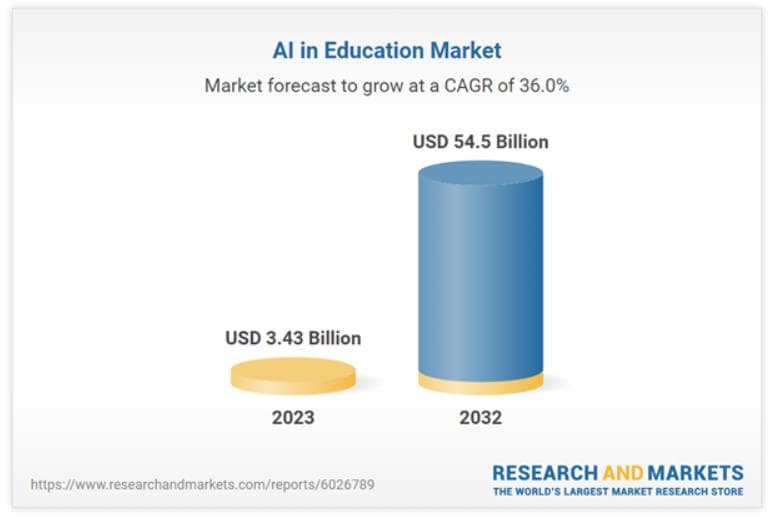Listen to the podcast :
The integration of AI in education apps is transforming the way we learn, teach, and interact with educational content. From personalized learning experiences to intelligent tutoring systems, artificial intelligence in education apps is reshaping the eLearning industry. Let’s dive into how AI in eLearning apps is making waves and how WeblineIndia is at the forefront of this technological revolution.
Want to integrate AI into your education app for smarter learning?
Research and Markets publishes AI in education market global forecast report between 2024 and 2032: The Global AI in Education Market is projected to grow from US3.43 billion in 2023 to US3.43 billion in 2023 to US 54.50 billion by 2032, achieving a compound annual growth rate (CAGR) of 35.96% from 2024 to 2032.

Such significant growth is driven by several key factors such as:
- The increasing demand for personalized learning experiences,
- The need to reduce administrative burdens,
- The expansion of access to education,
- The widespread availability of digital devices, and
- The rapid advancements in AI technology.
The Role of AI in Education Apps
The role of AI in education apps goes beyond automation—it’s about creating smarter, more engaging, and result-driven learning experiences. With features like real-time feedback, adaptive assessments, and predictive analytics, AI-powered education apps help both students and educators improve outcomes. Whether it’s AI teaching apps for schools or AI learning apps for students, these solutions are reshaping the classroom and eLearning industries.
- Personalized Learning Paths: AI algorithms assess individual strengths and weaknesses by analyzing performance data, enabling the creation of customized study plans that cater to each learner’s unique needs.
- Real-Time Feedback: Instant feedback on quizzes, assignments, and interactive exercises helps learners identify mistakes and improve their understanding of concepts without delay.
- Predictive Analytics: By analyzing historical data, AI can identify at-risk students and suggest targeted interventions to help them stay on track and achieve their academic goals.
- Automated Content Generation: AI can generate quizzes, summaries, and even entire lessons based on curriculum requirements, reducing the workload for educators and ensuring consistent content quality.
- Adaptive Assessments: Tests that dynamically adjust their difficulty levels based on the learner’s performance ensure a balanced challenge, keeping students engaged and motivated.
What does UNESCO say about Artificial Intelligence in Education?
Emphasizing a human-centered approach, UNESCO advocates for AI in education to reduce inequalities in knowledge access and cultural diversity. Their frameworks guide policymakers and educators on AI’s opportunities, challenges, and necessary competencies.
Artificial Intelligence (AI) holds great potential to tackle major educational challenges and advance progress toward SDG 4. However, rapid technological growth presents risks that outpace current policies and regulations. UNESCO is committed to helping Member States harness AI for the Education 2030 Agenda while ensuring inclusivity and equity in its application.
How AI in eLearning Apps Enhances User Experience
AI in eLearning apps is redefining user engagement by making learning interactive and immersive. Features like chatbots, voice assistants, and virtual tutors are becoming standard in modern educational platforms. These tools simplify complex concepts and make learning accessible to a wider audience.
- Intelligent Chatbots: AI-powered chatbots provide 24/7 support, answering student queries, guiding them through course materials, and even offering reminders for upcoming deadlines or exams.
- Voice-Activated Assistants: Voice-enabled AI tools allow users to access learning materials hands-free, making it easier for multitasking learners to study while performing other activities.
- Gamification: AI-driven gamified elements, such as leaderboards, badges, and rewards, make learning fun and increase retention rates by keeping students motivated and engaged.
- Virtual Reality (VR) and Augmented Reality (AR): AI-powered immersive experiences bring abstract concepts to life, allowing students to explore complex topics in a visually engaging and interactive manner.
- Multilingual Support: NLP enables real-time translation of educational content, making it accessible to non-native speakers and breaking down language barriers in global learning environments.
How AI Makes Learning Personalized
One of the most searched questions is: How do educational apps make learning personalized? The answer lies in AI’s ability to track and adapt.
- Adaptive Learning Paths: AI adjusts lesson difficulty based on student progress.
- Smart Content Recommendations: Learners receive course suggestions that align with their performance and interests.
- Emotion AI & Engagement Tracking: Apps detect whether learners are disengaged and adjust pacing accordingly.
These features explain why AI-powered learning apps are considered the future of digital education.
Looking to make your learning app more interactive and engaging?
The Technical Backbone of AI Education App Development
Developing AI education apps requires a deep understanding of both educational principles and cutting-edge technology.
Here’s a glimpse into the technical aspects:

- Machine Learning Models: These models analyze vast amounts of user data to identify patterns, predict learning outcomes, and deliver personalized recommendations for each student.
- Natural Language Processing (NLP): NLP powers chatbots, voice assistants, and content summarization tools, enabling seamless communication between users and the app.
- Cloud Computing: Cloud-based infrastructure ensures scalability and accessibility, allowing educational apps to handle large user bases and deliver content seamlessly across devices.
- Data Security: Robust encryption and compliance with regulations like GDPR ensure that sensitive user information is protected from unauthorized access or breaches.
- APIs and Integrations: APIs enable seamless connectivity with third-party tools like Learning Management Systems (LMS) and Customer Relationship Management (CRM) platforms, enhancing functionality and user experience.
- Big Data Analytics: AI-powered big data analytics processes large datasets to derive actionable insights into user behaviour, helping educators and institutions optimize content delivery and improve learning outcomes.
Benefits of AI in Learning Apps for Educators and Institutions
Educators and institutions are also reaping the benefits of AI in learning apps. These tools streamline administrative tasks, improve teaching efficiency, and provide valuable insights into student performance.

- Automated Administrative Tasks: AI can handle time-consuming tasks like scheduling, attendance tracking, and grading, allowing educators to focus more on teaching and mentoring students.
- Performance Analytics: Detailed reports on student progress help educators identify areas where students are struggling and tailor their teaching methods to address these challenges.
- Resource Optimization: AI identifies underutilized resources, such as unused course materials or tools, and suggests improvements to maximize their effectiveness.
- Professional Development: AI-driven platforms offer training modules for teachers, helping them upgrade their skills and stay updated with the latest teaching methodologies.
- Inclusive Education: AI tools support students with disabilities by providing accessible content, such as text-to-speech functionality and assistive technologies, ensuring equal learning opportunities for all.
AI Apps for Students vs. AI Apps for Educators
AI solutions cater to different needs depending on the audience:
- AI Apps for Students: Focus on personalized learning paths, gamified quizzes, multilingual support, and smart study assistants. They help school and college students stay motivated and learn at their own pace.
- AI Apps for Educators: Designed for automated grading, performance analytics, and content delivery optimization. These apps reduce workload and allow teachers to focus on mentoring.
This distinction highlights how AI education apps improve both learning outcomes and teaching efficiency simultaneously.
Challenges in Implementing Artificial Intelligence in Education Apps
While the benefits are immense, implementing AI in education apps comes with its own set of challenges. Addressing these is crucial for successful deployment.
- Data Privacy Concerns: Handling sensitive student data requires robust security measures to prevent breaches and ensure compliance with data protection regulations.
- High Development Costs: Building AI-powered apps can be resource-intensive, requiring significant investment in technology, infrastructure, and skilled personnel.
- Algorithm Bias: Ensuring AI models are unbiased and inclusive is critical to avoid perpetuating existing inequalities or stereotypes in educational content.
- User Adoption: Educators and students may resist adopting new technologies without proper training or a clear understanding of their benefits.
- Infrastructure Requirements: AI systems often require high computational power and storage, which can be a challenge for institutions with limited resources.
Another challenge is ensuring AI apps for education remain affordable and accessible in regions like India. While many schools adopt smart education apps, limited infrastructure and training often slow adoption. To maximize impact, developers must focus on creating AI-powered educational software that works across low-bandwidth devices and supports multiple languages.
WeblineIndia: Pioneering AI in Learning Apps
At WeblineIndia, we specialize in AI development for education apps creating solutions that are both innovative and impactful. Our team of experts combines technical expertise with a deep understanding of educational needs to deliver apps that stand out.
- Custom AI Solutions: We build tailored AI features to meet specific client requirements, ensuring that each app addresses the unique needs of its target audience.
- Seamless Integration: Our developers ensure smooth integration of AI capabilities into existing platforms, enhancing functionality without disrupting user experience.
- Scalable Architecture: We design apps that grow with your user base, ensuring long-term success and adaptability to changing educational demands.
- User-Centric Design: Our apps prioritize usability, ensuring a seamless experience for both educators and learners, with intuitive interfaces and easy navigation.
- End-to-End Support: From ideation to deployment and maintenance, we provide comprehensive support to ensure the success of your AI-powered educational app.
How We Help Clients Integrate Artificial Intelligence in Education Apps
Whether it’s a mobile app or a website, we help our clients integrate the best AI in learning apps through outsourcing development to enhance their digital products.. From intelligent recommendation engines to automated grading systems, we bring the power of AI to your platform.

- AI-Powered Analytics: Gain insights into user behavior, such as engagement levels and learning patterns, to optimize content delivery and improve learning outcomes.
- Automated Assessments: Save time with AI-driven grading systems that evaluate assignments, quizzes, and exams with high accuracy and provide instant feedback to students.
- Interactive Content: Use AI to create dynamic, engaging learning materials, such as interactive videos, simulations, and quizzes, that cater to different learning styles.
- Personalized Recommendations: Suggest courses, resources, and activities based on user preferences, performance data, and learning goals, ensuring a tailored learning experience.
- Multimodal Learning: Combine text, audio, video, and interactive elements to create a holistic learning experience that caters to diverse learning preferences and needs.
Best AI Education Apps in 2025 and beyond
As students and educators increasingly adopt AI-powered tools, several apps stand out for their innovation and results. Here are some of the best AI education apps in 2025 and beyond:
- Duolingo (AI-Powered Language Learning): Uses NLP to adapt lessons based on student performance.
- Socratic by Google: AI helps students solve math, science, and humanities problems with step-by-step explanations.
- Coursera AI Mentor: Provides AI-based career guidance and personalized course recommendations.
- Quizlet: AI creates adaptive quizzes and learning paths.
- BYJU’S AI Tutor (India): Personalized learning for school students using predictive analytics.
These AI education apps showcase how personalization, gamification, and adaptive learning make digital education more engaging and effective.
Future Trends in AI Education App Development
The future of AI in app development for education sector is bright, with several emerging trends set to redefine the industry.
- Emotion AI: Detects student emotions through facial recognition and voice analysis to provide tailored support and improve engagement.
- Blockchain Integration: Ensures secure and transparent record-keeping for certifications and achievements, enhancing trust and credibility in online education.
- AI-Driven Career Guidance: Helps students choose career paths based on their skills, interests, and market demand, ensuring better alignment with future opportunities.
- Collaborative Learning Platforms: AI facilitates group learning by matching students with similar goals and interests, fostering collaboration and peer-to-peer learning.
- Lifelong Learning: AI-powered platforms will support continuous skill development for professionals, enabling them to stay competitive in a rapidly changing job market.
Conclusion
The impact of AI in education apps is undeniable. From personalized learning to intelligent tutoring, AI in eLearning apps is setting new standards in the education sector. At WeblineIndia, we are committed to accelerating the development process and integrating advanced AI features to help our clients stay ahead in this competitive space. Let’s build the future of education together!
Social Hashtags
#AIinEducation #eLearningRevolution #EdTechInnovation #FutureOfLearning #AIpoweredLearning #WeblineIndiaAI #PersonalizedEducation #SmartLearningSolutions #TechInTeaching #EducationalAI
Looking to build the next-gen AI-powered education app?
Frequently Asked Questions
Testimonials: Hear It Straight From Our Global Clients
Our development processes delivers dynamic solutions to tackle business challenges, optimize costs, and drive digital transformation. Expert-backed solutions enhance client retention and online presence, with proven success stories highlighting real-world problem-solving through innovative applications. Our esteemed Worldwide clients just experienced it.
Awards and Recognitions
While delighted clients are our greatest motivation, industry recognition holds significant value. WeblineIndia has consistently led in technology, with awards and accolades reaffirming our excellence.

OA500 Global Outsourcing Firms 2025, by Outsource Accelerator

Top Software Development Company, by GoodFirms

BEST FINTECH PRODUCT SOLUTION COMPANY - 2022, by GESIA

Awarded as - TOP APP DEVELOPMENT COMPANY IN INDIA of the YEAR 2020, by SoftwareSuggest